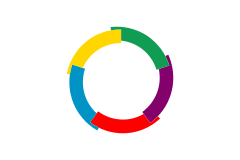LGBT rights in La Francophonie
In much of the Organisation internationale de la Francophonie, including former colonies of France, same-sex sexual activity is not considered a criminal offense. This is due, in part, to the lack of existing anti-homosexuality laws at the time of French rule. However, in most of the member states, including those states in which same-sex sexual activity is not criminalized, social taboos against it remain. In a small minority of member states, same-sex couples are allowed the ability to register civil unions or marriages.
Legality of same-sex sexual activity
Member states with legal recognition of same-sex relationships and protection from discrimination[1]
Note: † Signed UN General Assembly declaration in favour of LGBT rights. ‡ Signed alternative Statement against LGBT rights.
Member states in which same-sex sexual activity is legal and protected with anti-discrimination laws[1]
Note: † Signed UN General Assembly declaration in favour of LGBT rights. ‡ Signed alternative Statement against LGBT rights.
|
Africa
|
Europe
|
Member states in which same-sex sexual activity is not a crime[1]
Note: † Signed UN General Assembly declaration in favour of LGBT rights. ‡ Signed alternative Statement against LGBT rights.
|
Africa
|
Americas
|
Asia
|
Europe
|
Oceania
|
Member states in which all same-sex sexual activity is a crime[1]
Note: † Signed UN General Assembly declaration in favour of LGBT rights. ‡ Signed alternative Statement against LGBT rights.
Member states in which only male same-sex sexual activity is a crime[1]
|
Africa
|
Americas
|
